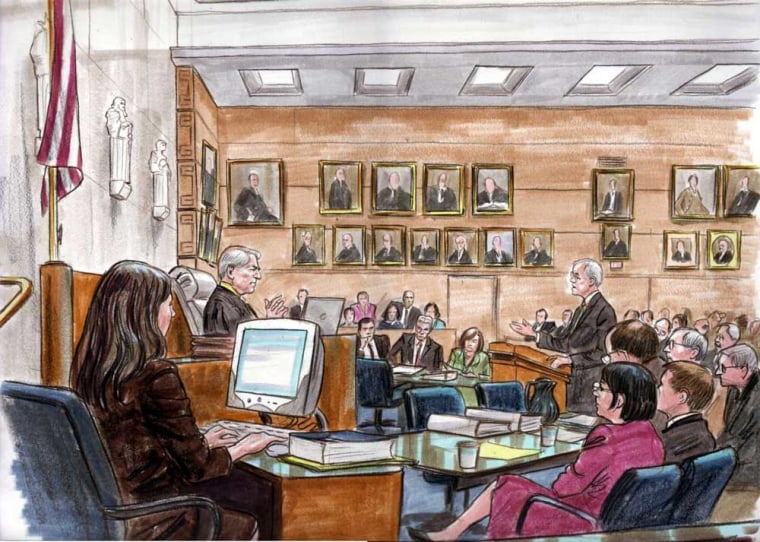A federal judge has ruled that an FBI raid in May on Louisiana Congressman William Jefferson's Capitol Hill offices was legal and constitutional - "There was no impermissible intrusion on the legislature."
The search of Jefferson's office on the weekend of May 20th was the first ever of a congressman's office in the history of Congress.
Today the Department of Justice was given the authority to control the custody of the seized materials and to resume its review of those materials.
President Bush had ordered the seized materials - which included documents and several computer hard drives - sequestered by the U.S. Solicitor General's office for 45 days. That period ended on Sunday.
Judge Thomas Hogan ruled that there is "No support for the proposition that a Member of Congress must be given advance notice of a search."
Judge Hogan, in a 28-page opinion writes, "No one argues that the warrant executed upon Congressman Jefferson's office was not properly administered. Therefore, there was no impermissible intrusion on the legislature."
No separation of power breach
He writes that the search which lasted some 18-hours on that weekend in May did not violate the separation of powers, between the Legislative and the Executive branches of government, "If there is any threat to the separation of powers here, it is not from the execution of a search warrant by one co-equal branch of government upon another, after the independent approval of the third separate, and co-equal branch."
Hogan is the judge who authorized the FBI raid by signing the search warrant.
Even though the fact that some privileged material was incidentally captured by the search, the Judge observes, "does not constitute an unlawful intrusion."
No speech and debate violation
Also at issue, a provision in the U.S. Constitution - known as the Speech and Debate Clause - which protects Members of Congress from being questioned by the president, a prosecutor or a plaintiff in a lawsuit concerning their legislative work.
In his ruling, Judge Hogan says, "Congressman Jefferson has not been made to answer, either in terms of questions or in terms of defending himself from prosecution, for speech or activities done in furtherance of the legislative process. Therefore, the search did not violate the Speech or Debate Clause."
"Speech or Debate Clause does not shield Members of Congress from the execution of valid search warrants. Congressman Jefferson's interpretation of the Speech or Debate privilege would have the effect of converting every congressional office into a taxpayer-subsidized sanctuary for crime." Hogan writes.
The Department of Justice had argued in a hearing that they had exhausted all reasonable and timely alternative means of obtaining evidence they sought from Jefferson.
The Judge agreed in part with Jefferson's lawyers that the Capitol Hill search "entailed an invasion somewhat greater than usual" but he writes, "the Government has demonstrated a compelling need to conduct the search in relation to a criminal investigation involving very serious crimes, and has been unable to obtain the evidence sought through any other reasonable means."
Appeal expected
Robert Trout, Jefferson's attorney has told NBC that he will likely appeal the judge's ruling. Trout says his goal is to have the seized materials returned to Jefferson.
Attorneys for the bipartisan leadership of the House - who wrote an amicus brief opposing the search of Rep Jefferson's Capitol Hill offices - say they are not surprised by the ruling today.
The congressional lawyers also said they expect an appeal by Jefferson's attorney. They added talks have been ongoing with the Justice Department in trying to reach an agreement on procedures to be followed if DOJ decides to raid another congressional office. But, as of now, "nothing has been concluded."
Following Hogan’s ruling, the Department of Justice’s Deputy Director of Public Affairs Brian Roehrkasse issued a statement, saying, “We are pleased with this decision which allows us to move forward in this investigation using the documents that the court has concluded were lawfully obtained," adding, “At the same time, we will also continue our discussions with Congress about harmonizing policies and procedures for possible future searches."
Jefferson, according to court documents, is being investigated concerning allegations that he solicited and accepted bribes to help promote a cable television and Internet business in West Africa.
The congressman has not been charged and has insisted he has an explanation for all the allegations. Jefferson has repeatedly predicted he will eventually be cleared of all wrongdoing.
Joel Siedman is an NBC Producer based in Washington, DC.
NBC producer Mark Kosnar contributed to this story.
